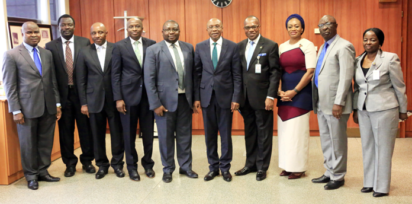As the Monetary Policy Committee, MPC, of the Central Bank of Nigeria begins its third meeting of the year today, analysts have said members of the committee will retain the Monetary Policy Rate, MPR, at 14 percent for the 10th consecutive time.
At its last meeting in May this year, the MPC maintained the MPR at 14 percent, with the asymmetric corridor at +200 and -500 basis points around the MPR; it retained the Cash Reserve Ratio, CRR, and Liquidity Ratio, LR, at 22.50 percent and 30 percent respectively.
The MPC has retained the MPR at 14 percent since July 2016 when it hiked the rate for the third consecutive row in a year in response to rising inflation rate, which peaked at 18.72 percent in January 2017.
Though the inflation rate had been on the downward trend since then, falling for the 16th consecutive month to 11.61 percent in May, the MPC had continued to retain the MPR at 14 percent citing risks to the inflation outlook exchange rate stability.
Commenting on the outcome of the MPC holding today, Managing Director/Chief Executive, Financial Derivatives Company Limited, Mr. Bismarck Rewane, stated that the MPC will not make any change. He made this prediction at the July edition of the Lagos Business School Executive Breakfast meeting.
Also analysts at FSDH Merchant Bank Limited projected that the MPC may hold its policy rate. They stated: “The Monetary Policy Committee, MPC, of the Central Bank of Nigeria may hold rates when it meets next week.
Although there are justifications to ease the policy, the view of the MPC members that fiscal injections and rising rates in the international market would have adverse impacts on price stability in Nigeria may not allow the MPC to ease policy.
Weak economic and credit growth in Nigeria do not justify rates hike. FSDH Research expects that the Federal Open Market Committee, FOMC, of the United States Federal Reserve (The Fed) may increase the Fed Rate when it meets in September and December 2018.
They also expect Fed’s action may push funds further into the US Treasury market, and also push global yields upwards, leading to additional pressure in emerging markets, and, therefore, concluded that a tight monetary policy will be appropriate in this context.
They stated: “Looking at possible policy options open to the MPC, members may vote to retain rates at the current levels.
However, FSDH believes if the MPC members’ fear about the impact of fiscal injections and rising rate in the international market on domestic price stability does not materialise; policy easing may be required very soon.
“Notwithstanding the hold decision, FSDH Research expects the yields on FGN Bonds to rise further from the current levels. The borrowing needs of the FGN and the rising yields in the international market will be the major drivers.”













